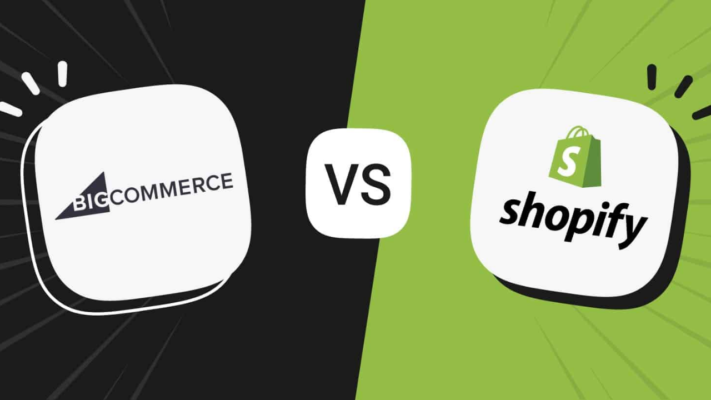
In the dynamic world of e-commerce, choosing the right platform can make or break your online business. Two of the most prominent players in the industry are BigCommerce and Shopify, both offering a comprehensive suite of features and tools to help merchants succeed online. As we move into 2024, these platforms have undergone significant updates and enhancements, making it crucial to evaluate their latest offerings. In this comprehensive blog post, we’ll dive deep into the battle between BigCommerce vs Shopify, analyzing their features, pricing, scalability, and more to help you make an informed decision.
Introduction
E-commerce has become an integral part of modern business, and selecting the right platform is a critical step towards success. BigCommerce and Shopify have established themselves as industry leaders, catering to businesses of all sizes, from small startups to large enterprises. While both platforms share some similarities, they also have distinct differences that can influence your choice. This blog post aims to provide an in-depth comparison of BigCommerce vs Shopify, taking into account their latest updates and features as of 2024.
Overview of BigCommerce and Shopify
BigCommerce
Established in 2009, BigCommerce is a robust, feature-rich e-commerce platform that offers a wide range of tools and solutions for businesses of all sizes. Known for its scalability and flexibility, BigCommerce has consistently evolved to meet the changing needs of online merchants. With a focus on enterprise-level capabilities, BigCommerce caters to businesses looking for a powerful and customizable platform to support their growth.
Shopify
Founded in 2006, Shopify has become a household name in the e-commerce world. Known for its user-friendly interface and extensive app ecosystem, Shopify has gained widespread popularity among small and medium-sized businesses. With a strong emphasis on ease of use and rapid deployment, Shopify has been a go-to choice for entrepreneurs and startups seeking a reliable and cost-effective e-commerce solution.
Comparing the Latest Features and Updates
Ease of Use
In the battle of BigCommerce vs Shopify, ease of use is a crucial factor for many merchants. While both platforms have made strides in improving their user experience, Shopify continues to hold an edge in terms of simplicity and intuitiveness. Its clean and visually appealing interface, coupled with a user-friendly drag-and-drop website builder, makes it an attractive choice for those with limited technical expertise.
On the other hand, BigCommerce offers a more robust and feature-rich platform, which can be more challenging for novice users to navigate. However, BigCommerce has made significant improvements in its user interface and documentation, making it more accessible to a wider range of merchants.
Themes and Design
When it comes to themes and design, both BigCommerce and Shopify offer a wide range of options to help merchants create visually appealing and engaging online stores. Shopify boasts a vast library of free and premium themes, allowing merchants to quickly set up a professional-looking website without the need for extensive coding knowledge.
BigCommerce, on the other hand, has a smaller selection of themes compared to Shopify, but many of them are highly customizable and optimized for conversion. Additionally, BigCommerce offers more advanced design tools and APIs, giving developers greater control over the look and feel of their online stores.
Product Management and Inventory
Efficient product management and inventory control are essential for any e-commerce business. In the latest iterations of BigCommerce vs Shopify, both platforms have introduced new features and enhancements to streamline these processes.
BigCommerce offers robust product management capabilities, including advanced inventory tracking, multiple product options, and bulk editing tools. Its integration with popular ERP and inventory management systems makes it a strong choice for businesses with complex product catalogs and inventory needs.
Shopify, on the other hand, has also made significant improvements to its product management features, introducing new tools for creating product bundles, managing variants, and tracking inventory across multiple locations. Additionally, Shopify’s integration with third-party inventory management apps and its own Point of Sale (POS) system make it a viable option for businesses with physical storefronts.
Checkout and Payment Processing
A seamless checkout experience and secure payment processing are critical components of any successful e-commerce platform. In the latest updates, both BigCommerce and Shopify have focused on enhancing these aspects to provide a better shopping experience for customers and streamline operations for merchants.
BigCommerce offers a highly customizable checkout process, allowing merchants to tailor the experience to their specific needs. Its robust payment gateway integrations and support for popular payment methods ensure a smooth and secure transaction process for customers.
Shopify, known for its user-friendly approach, has further simplified its checkout process, making it easier for customers to complete their purchases. Additionally, Shopify’s native payment gateway, Shopify Payments, offers competitive rates and seamless integration, making it an attractive option for merchants looking to streamline their payment processing.
Marketing and SEO
Effective marketing and search engine optimization (SEO) strategies are crucial for driving traffic and increasing sales in the e-commerce landscape. Both BigCommerce and Shopify have made significant strides in providing merchants with powerful marketing and SEO tools in their latest updates.
BigCommerce offers a comprehensive suite of built-in marketing tools, including email marketing campaigns, abandoned cart recovery, and product recommendations. Its robust SEO capabilities, such as customizable URLs, meta tags, and sitemaps, help merchants optimize their online stores for better search engine visibility.
Shopify has also stepped up its game in the marketing and SEO arena. Its latest updates include improved SEO tools, such as automatic sitemaps and customizable meta tags, as well as powerful marketing features like email campaigns, social media integration, and abandoned cart recovery.
Scalability and Growth Potential
One of the key considerations when choosing an e-commerce platform is its ability to scale and support business growth. In the battle of BigCommerce vs Shopify, both platforms offer scalable solutions, but with different approaches and target audiences.
BigCommerce is designed with enterprise-level scalability in mind, making it a strong choice for businesses with ambitious growth plans. Its robust architecture and extensive customization options allow merchants to tailor the platform to their specific needs and handle high traffic volumes and complex operations.
On the other hand, Shopify initially gained popularity as a platform for small and medium-sized businesses. However, in recent years, Shopify has introduced enterprise-level solutions like Shopify Plus, catering to the needs of larger businesses and high-growth companies. While Shopify Plus offers advanced features and scalability, it may come with a higher price tag for some merchants.
Pricing and Value for Money
Pricing and value for money are crucial considerations when evaluating e-commerce platforms. In the battle of BigCommerce vs Shopify, both platforms offer various pricing plans to cater to different business sizes and requirements.
BigCommerce offers four main pricing plans, ranging from a Standard plan for smaller businesses to an Enterprise plan for larger organizations. These plans vary in terms of features, bandwidth, and support options, with the higher-tier plans offering more advanced capabilities and customization options.
Shopify, on the other hand, has a more streamlined pricing structure with three main plans: Basic Shopify, Shopify, and Advanced Shopify. Additionally, Shopify offers Shopify Plus, a more robust and scalable solution for enterprise-level businesses. While Shopify’s pricing plans may be more affordable for small to medium-sized businesses, the costs can quickly add up as businesses grow and require additional features or services.
It’s important to note that both platforms offer additional add-ons and third-party integrations, which can impact the overall cost of ownership. Merchants should carefully evaluate their specific needs and compare the total cost of ownership, including any additional fees or services required, to make an informed decision.
Customer Support and Community
In the fast-paced world of e-commerce, reliable customer support and a strong community can be invaluable assets. Both BigCommerce and Shopify have invested heavily in their support and community resources to ensure merchants have access to the guidance and resources they need.
BigCommerce offers various support channels, including 24/7 technical support, a comprehensive knowledge base, and an active community forum. Additionally, BigCommerce provides dedicated account managers and support teams for its higher-tier plans, ensuring merchants receive personalized assistance.
Shopify, known for its strong emphasis on customer experience, offers extensive support resources, including live chat, email support, and a vast knowledge base. Shopify’s active community forums and ecosystem of experts and developers also contribute to a wealth of knowledge and support for merchants.
Integrations and App Ecosystems
In today’s digital landscape, integrations and app ecosystems play a crucial role in enhancing the functionality and capabilities of e-commerce platforms. Both BigCommerce and Shopify have recognized this importance and have built robust ecosystems of third-party integrations and apps.
Integrations and App Ecosystems (Continued)
BigCommerce boasts a vast app store with over 600 integrations, covering various aspects of e-commerce operations, such as marketing, shipping, accounting, and customer relationship management (CRM). These integrations allow merchants to seamlessly connect their online stores with other essential business tools and services, streamlining processes and enhancing overall efficiency.
Shopify’s app store, on the other hand, is one of the largest and most diverse in the e-commerce industry, offering thousands of apps and integrations. From payment gateways and shipping carriers to marketing automation and analytics tools, Shopify’s app ecosystem provides merchants with a vast array of options to customize and enhance their online stores.
While both platforms offer robust app ecosystems, it’s essential to evaluate the specific integrations and apps that align with your business needs and ensure they are compatible with the chosen platform.
Security and Compliance
In the online world, security and compliance are paramount concerns for both merchants and customers. Both BigCommerce and Shopify have implemented robust security measures and compliance standards to protect sensitive data and ensure a safe and secure shopping experience.
BigCommerce takes security seriously, offering industry-standard SSL encryption, PCI-compliant hosting, and regular security audits. Additionally, BigCommerce provides advanced security features, such as IP address filtering and two-factor authentication, to further enhance the security of online stores.
Shopify is also committed to maintaining high security standards, with features like SSL encryption, PCI-compliant hosting, and regular security updates. Shopify also offers additional security measures, such as fraud analysis and protection, to safeguard merchants and customers from potential threats.
While both platforms prioritize security and compliance, it’s essential for merchants to review their specific requirements and ensure that the chosen platform meets all necessary industry standards and regulations.
Industry-Specific Solutions
As e-commerce continues to evolve, both BigCommerce and Shopify have recognized the importance of offering industry-specific solutions to cater to the unique needs of various sectors. These tailored solutions can provide merchants with a competitive edge and a more streamlined experience within their respective industries.
BigCommerce has developed industry-specific solutions for verticals such as fashion and apparel, automotive, and food and beverage. These solutions often include pre-built integrations, customized themes, and industry-specific features to help merchants quickly establish an online presence and cater to the specific requirements of their target market.
Similarly, Shopify offers industry-specific solutions for sectors like fashion, food and beverage, and health and wellness. These solutions often include tailored themes, specialized apps, and integrations with industry-specific tools and services, making it easier for merchants to set up and manage their online stores within their respective niches.
By leveraging these industry-specific solutions, merchants can save time and resources while ensuring their online stores are optimized for their target market and meet the unique demands of their industry.
Emerging Trends and Future Outlook
The e-commerce landscape is constantly evolving, with new trends and technologies shaping the future of online shopping. Both BigCommerce and Shopify are actively investing in emerging trends and technologies to stay ahead of the curve and provide merchants with cutting-edge solutions.
One of the most significant trends in e-commerce is the integration of artificial intelligence (AI) and machine learning (ML) technologies. Both platforms have begun to incorporate AI and ML capabilities into their offerings, enabling features such as personalized product recommendations, predictive analytics, and automated marketing campaigns.
Additionally, the rise of headless commerce, which separates the front-end and back-end of an e-commerce platform, is gaining traction. This approach allows for greater flexibility and customization, enabling merchants to create unique and engaging shopping experiences while leveraging the powerful back-end capabilities of platforms like BigCommerce and Shopify.
Another emerging trend is the increasing importance of omnichannel commerce, which seamlessly integrates online and offline shopping experiences. Both BigCommerce and Shopify have introduced solutions to support omnichannel strategies, such as in-store pickup, buy online, pick up in-store (BOPIS), and enhanced inventory management across multiple locations.
As these trends continue to shape the e-commerce landscape, it will be crucial for merchants to choose a platform that can adapt and evolve with the changing times. Both BigCommerce vs Shopify have demonstrated their commitment to innovation and their ability to stay ahead of the curve, making them strong contenders in the battle for e-commerce dominance.
Conclusion
In the ever-evolving world of e-commerce, the choice between BigCommerce and Shopify is a critical decision that can significantly impact the success of your online business. Both platforms have their strengths and weaknesses, catering to different business needs and target audiences.
BigCommerce shines as a robust and scalable solution, offering enterprise-level capabilities and advanced customization options. Its focus on flexibility and scalability makes it an ideal choice for businesses with ambitious growth plans and complex operational requirements.
On the other hand, Shopify’s user-friendly interface and extensive app ecosystem make it an attractive option for small to medium-sized businesses and entrepreneurs seeking a straightforward and cost-effective e-commerce solution. Additionally, Shopify’s enterprise-level offerings, such as Shopify Plus, have expanded its appeal to larger businesses.
Ultimately, the decision between BigCommerce vs Shopify will depend on your specific business needs, growth plans, budget, and technical expertise. It’s essential to carefully evaluate each platform’s features, pricing, scalability, and compatibility with your existing business processes and tools.
Regardless of your choice, both BigCommerce and Shopify are constantly evolving, introducing new features and updates to stay ahead in the competitive e-commerce landscape. By staying informed about the latest developments and leveraging the power of these platforms, merchants can create engaging online experiences, streamline operations, and drive growth for their e-commerce businesses.
If you need expert guidance and assistance in selecting and implementing the right e-commerce platform for your business, consider partnering with Upcore Technologies. As a leading technology consulting firm, Upcore Technologies has extensive experience in helping businesses navigate the complexities of e-commerce platforms and develop tailored solutions that drive growth and success.


